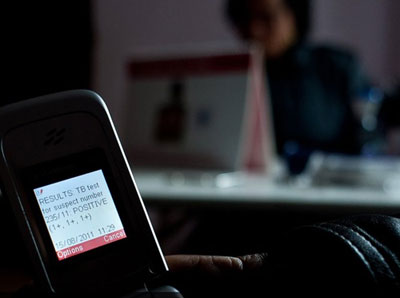- What We Do
- Agriculture and Food Security
- Democracy, Human Rights and Governance
- Economic Growth and Trade
- Education
- Ending Extreme Poverty
- Environment and Global Climate Change
- Gender Equality and Women's Empowerment
- Global Health
- Water and Sanitation
- Working in Crises and Conflict
- U.S. Global Development Lab

TB results are shown using mobile technology for a more rapid result.
Photo credit: WHO/Nuttall
In Nigeria, health workers are using smartphones at more than 500 facilities to more accurately diagnose and treat tuberculosis (TB). The use of smartphones results from a successful pilot program to integrate mobile technology into the TB supervision process. This program is part of an effort by the National TB and Leprosy Control Program (NTBLCP) to tap into mobile technology to provide more supportive supervision and improve health services, especially in areas with high defaulter rates, drug stock outs and TB-HIV services integration.
By using smartphones on their facility visits to collect TB data, supervisors and health care workers have eliminated the need for printed forms, minimized human error in data entry, reduced the lag time for getting data to policymakers and managers and helped pinpoint ways to improve the quality of care. Results from Lagos and Abia States show impressive clinical impact.
- In Abia pilot sites, the percent of TB-HIV co-infected patients on co-trimoxazole preventive treatment jumped from 34 percent to 100 percent in one year.
- In Lagos pilot sites, the number of TB-HIV co-infected patients on antiretroviral therapy increased from 26 percent to 72 percent in the same year. Defaulter rates in both states have also declined considerably.







Comment
Make a general inquiry or suggest an improvement.